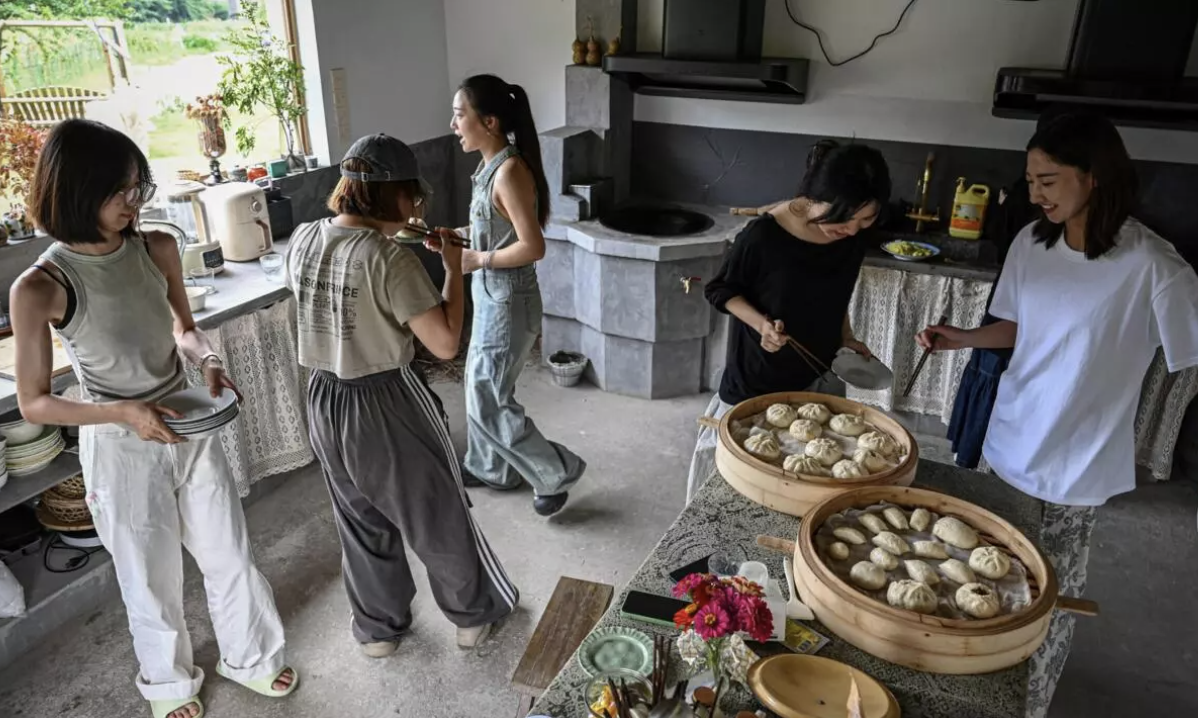"Being in a women-only space makes it easier for me to talk and feel more comfortable," says 43-year-old Zhang Wenjing. "Not wearing a bra is already a form of freedom."
She is one of many women seeking out female-only spaces like bars, gyms, hostels, and co-working centers—a trend that is flourishing in China.
A 2024 report by the China Fitness and Bodybuilding Association shows there are now over 1,200 women-only gyms, a 35% increase compared to 2022. In tourist cities like Chengdu and Dali, the number of women-only bars and homestays is growing, catering to the need for safety and comfort when going out.
 |
Chen Yani (in white) cooks with friends in a kitchen in Hangzhou, China. Photo: France24 |
Chen Yani (in white) cooks with friends in a kitchen in Hangzhou, China. Photo: France24
28-year-old Chen Yani founded Keke's Imaginative Space, a women-only retreat, after experiencing repeated harassment at work. She started the project by renovating a house in Lin'an, on the outskirts of Hangzhou, about 200 km from Shanghai. Chen's guests pay 4 USD a night, with the price increasing to 11 USD from the fourth night onwards.
Chen organized a Lunar New Year holiday with dozens of participants after noticing many women wanted a change of scenery or to avoid pressure from relatives about marriage and childbirth. She believes that within families, women often bear the responsibility of caring for parents, children, and housework, in addition to their professional duties. "They need a place just to be themselves," Chen says.
29-year-old Yuan Xiaoqian says economic independence and educational opportunities give women more choices and allow them to focus on themselves. They need communities where they can "temporarily avoid" men.
In Xiuxi village, Zhejiang province, Yang Yun opened Her Space as a place of emotional healing for women. The rustic interior and calligraphy on the walls create a hotel-like atmosphere. The space is exclusively for women who have experienced job loss, the death of a parent, arguments with their husbands, or burnout from city life.
"I hope they find a sense of warmth," she says. Currently, 120 women have paid 580 USD to join the club. Yang emphasizes that whether they come frequently or not, the space exists and provides emotional support.
Some social researchers believe this trend shouldn't be encouraged. They argue that women-only spaces are not very effective in "healing" and instead promote antagonism between men and women.
However, Chen Yani disagrees, asserting that women have the right to their own spaces. She emphasizes that they understand each other better and show more empathy. Although not yet profitable, she believes that as long as there's a need, the space will continue to exist.
Lilith Jiang, founder of a women-only cultural space in Beijing, believes these community-oriented establishments fill a void. "Men have many opportunities to socialize while drinking or exercising, but women don't," she says.
In the long term, shared living spaces exclusively for women could be an alternative for single women worried about growing old alone.
Ngoc Ngan (France 24)












